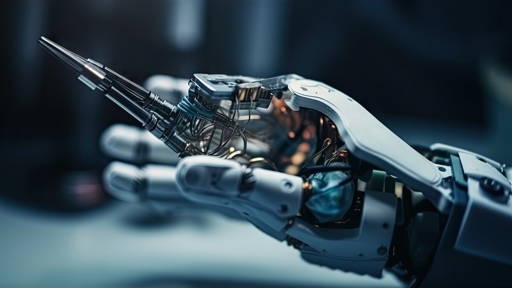"Imagine that at the age of 80, you can still feel like a 25-year-old and enjoy good health." Well, few people today believe in such promises that sound like marketing slogans. For centuries all kinds of charlatans and alchemists have tried to stop time by reaching for superstition-based methods, from blood transfusions to magical herbs. Today, science has replaced them. Thanks to antibiotics, innovations in medicine and pharmacy, including vaccinations, and the growing knowledge about the impact of lifestyle on health, life expectancy for Europeans has skyrocketed to 80 years. Two hundred years ago, it was half that.
In the coming years, advances in decoding the human genome, artificial intelligence, and quantum computing is going to drive the new scientific field of longevity. The author of 'The Science and Technology of Growing Young' highlights five technologies expected to make our lives longer and healthier.
Diagnosis is moving from laboratories to homes
Medicine is reactive, and doctors are putting out fires instead of prioritizing to make people stay healthy for as long as possible. New health monitoring technologies plan to change that – an increasing number of people are measuring health parameters with fitness bands or smart watches. Sensors in our homes and body can track vital signs day and night. All the data will go into the electronic health record (EHR), where AI algorithms can analyze it and compare it with information collected from millions of other people.
AI is going to drive the development of precision medicine
Although medicine offers sophisticated drugs, they are produced for the average patient. As a result – many patients do not respond to the therapy or suffer from side effects. The growing amount of data collected in electronic medical records – including whole genome sequencing and lifestyle – can create unique patient models allowing doctors to simulate therapies and drugs. Artificial intelligence can also help review the results of the latest scientific research and develop personalized recommendations for each patient. Additionally, AI can continuously analyze the body's response to treatment and make modifications in real-time. We are moving away from a one-fits-all medicine, which is ineffective, towards a "one-fits-one" model.
Genetic engineering can eliminate some diseases
Scientists and doctors already have technologies that allow them to edit DNA (CRISPR-Cas9, controlling or eliminating diseases that were until recently considered incurable. Examples include gene therapy for sickle cell disease and severe combined immunodeficiency (SCID), which involves programming the proteins in the body. The vaccine against COVID-19 is also the result of biomedical engineering.
A related gene therapy called CAR T therapy can be used in cancer patients and has proven effective in treating childhood leukemia and non-Hodgkin's lymphoma. Gene therapies are still costly, with the price tag for a cure for SCID reaching up to $1 million. However, these prices will drop as technology progresses and become more widespread.
Bionics makes it possible to replace organs and support their function
The line between what is natural and what is artificial in our bodies will then become blurred. Doctors are already replacing body parts: diseased teeth are replaced with implants, while damaged hips are replaced with new endoprostheses.
Scientists are working on 3D-printed organs and growing them inside the body. One of the first achievements is printing skin in the lab for patients with extensive burns. A team of engineers at Newcastle University has created a cornea for the eye using a bio-ink containing stem cells and proteins. Neuralink is working on a brain-computer interface to help people with disabilities move and communicate. Advances in bionics are urgently needed – more than 100,000 people in the US are waiting for life-saving organ transplants.
Futuristic technologies can help us to" live" forever
Would you like to talk and see each other again with someone who was important to you but is no longer alive? This is one of the most controversial technologies in longevity – creating digital avatars that are resurrected after death to preserve memories. Using 3D scanners and artificial intelligence, such as the technologies developed by Vive Studios, for example. The company generates holograms of terminally ill children. For some, this is a frightening and unethical innovation, while for others, it is a hopeful way to cope with loss after the passing of a loved one.
Similar disputes arise over the vision of recording a person's memory on a chip and transferring consciousness to a virtual world. However, this is a distant future for the time being.
Longevity: a dream or horror?
The fear of death and the development of new technologies like AI are driving the fast-growing longevity market. But extending life comes with several risks. First of all – overpopulation of the planet could lead to ecological disaster.
This argument can be disputed: in 1798, the economist Thomas Robert Malthus warned that rapid population growth would lead to global famine because farmers could never keep up with food production. What he did not assume, however, was that with progress, technologies also change. In the future, meat will be grown in laboratories, while genetic engineering and smart crops increase crop yields.
Another problem is the increase in social inequality. Modern gene therapies are not reimbursed in public health systems because of their exorbitant prices – in the future, only the richest could afford to replace a damaged liver or buy ultra-modern drugs. Then there is a third problem – what if a long life turned out to be a curse in the form of loneliness and isolation?
According to Sergey Young, these concerns should not inhibit innovation but stimulate a model in which it can become available to everyone.
But there is also good news. You can do a lot today to extend your life without a lot of money. In an additional chapter, Young presents ten ways – based on science – that each of us can easily incorporate into our lives to increase the likelihood of living to 100. Among them are tips on diet, exercise, sleep, and mental health.








